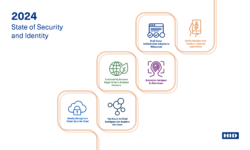Smart Credential Shipments Will Return to Pre-Pandemic Level in 2022
With the easing of chip shortages exptected to begin at the end of 2022, full resolution is not expected until 2024, says ABI Research.

(Image: Who is Danny/stock.adobe.com)
NEW YORK — Shipments of smart credentials will return to a pre-pandemic level of 596 million units in 2022, followed by significant growth year-on-year to a forecasted 766 million-unit shipments in 2026, according to ABI Research.
While the government ID market is, to a large extent, protected from the on-going chip shortage, the coming years will prove critical as demand picks back up and further supply tensions are placed on vendors for meticulous planning, collaboration and strategy to ensure timely delivery of sufficient chip supply, according to ABI.
The research firm forecasts ePassport shipments will rebound to 176 million in 2024, driven by the restored appetite for passport renewal as travel restrictions ease.
“Whereas greater impact from the chip shortage have been felt in certain end markets such the automotive industry for example, the government identity market has been shielded from the chip shortage,” explains Lucas Stewart, Citizen Digital Identity Research Analyst at ABI Research. “The market is tender based, meaning contractual obligations exist and are being fulfilled. Equally, the importance of ID in critical citizen services has ensured the priority of continued delivery of credentials by governments.”
Vendors on the other hand, Stewart continues, have a lack of alternative solutions. “This specifically applies in instances where chip manufacturers have government ties, such as in some cases of state-ownership in Asian companies,” he says.
The average selling price of certain chipsets has also played a role in allocation, where suppliers have pivoted toward unit production that yield higher margins, resulting in major reductions in SIM as a low ASP product.
“However, with new opportunities and renewals on the horizon, where demand is picking back up from the pandemic, we will perhaps see more of an effect of the shortage brought to government ID in the coming years where, currently, implications are minimal,” says Stewart.
The easing of global chip shortage will begin toward the end of 2022, at the earliest, with full resolution not expected until 2024 as investment in increased capacity comes online and begins to meet growing demand. Chip ASPs have clearly been impacted and significant increases are expected to be sustained to some degree after the shortage and are not expected to return to pre-chip shortage levels any time soon as investment costs need to be recouped.
“While not impacting existing identity projects, price increases will be felt in new business which, alongside the struggle in attaining supply, will add to difficulty in the short term as it relates to growth, making market share gains a challenging near-term prospect,” Stewart concludes.
These findings are from ABI Research’s The Impact of the Global Chipset Shortage on Citizen Digital Identities application analysis report.
If you enjoyed this article and want to receive more valuable industry content like this, click here to sign up for our FREE digital newsletters!

Security Is Our Business, Too
For professionals who recommend, buy and install all types of electronic security equipment, a free subscription to Commercial Integrator + Security Sales & Integration is like having a consultant on call. You’ll find an ideal balance of technology and business coverage, with installation tips and techniques for products and updates on how to add to your bottom line.
A FREE subscription to the top resource for security and integration industry will prove to be invaluable.













